I recently got an email from a reader who was curious about Portland’s blue bike lanes. I did a little research and decided to share my findings with everyone.
The City of Portland — with a grant from ODOT — first experimented with blue bike lanes back in 1997. They selected ten locations that according to an internal report had “a high level of cyclist and motorist interaction and conflict areas where motorists and cyclists had safety concerns.”
Some quick research revealed an interesting PDOT website with everything you ever wanted to know about blue bike lanes, including this in-depth report (PDT) that includes detailed anaysis and schematic drawings like the one below.

According to PDOT’s bike coordinator Roger Geller, they are moving forward and plan to install more of them:
“We’ve got almost 10 years of experience with them, analyzed them extensively when we first installed them, and recognize them as a legitimate traffic control device. We are intending to expand their use; the first new location will be at Everett & 16th at the entrance to I-405.”
I think painted blue bike lanes are an effective roadway treatment for high motorist/bicycle conflict areas. But — as with all lane markings — the danger is that they give a false sense of security to bicyclists.
In a PDOT report on the efficacy of the lanes, they found that the number of bicyclists that turned their head to look for motor vehicles decreased (from 43% to 26%) after the new markings were installed. This is not a good trend. Our safety depends on being aware of our surroundings at all times.
What are your experiences with the blue bike lanes? Do you feel they have improved your safety?



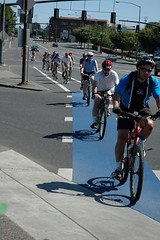
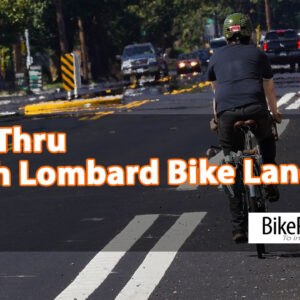
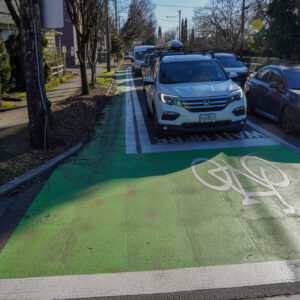
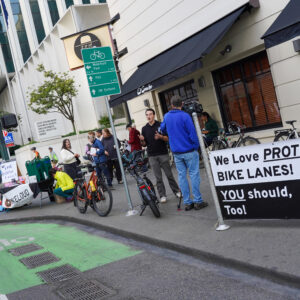
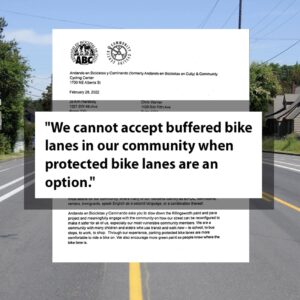
Thanks for reading.
BikePortland has served this community with independent community journalism since 2005. We rely on subscriptions from readers like you to survive. Your financial support is vital in keeping this valuable resource alive and well.
Please subscribe today to strengthen and expand our work.
The blue lane at the end of the Hawthorne Bridge (headed east) seems to work well. I (knock on wood) have had no scary incidents there. However, I feel most comfortable crossing it during rush hour, with the assumption that most drivers are on their regular route home and expect to see bikers there & know to yield. Again – this is an ASSUMPTION. I worry though about the random driver that they will not know what it means. I also am concerned that they do create false security for bikers.
I know the intersection at Everett & 16th is a bad one, and one I have suggested in past surveys about bike safety. I wonder if the blue line will really get drivers to look there. I’ve had to knock on some car windows in the past at that intersection to get a driver’s attention & not cut me off in their rush to the freeway.
The intersection at N Cook St and N Vancouver is one of these intersections. You’ve to too much going on there with highway access and a critical bike lane downtown. I would suggest closing Cook St entirely (and make it a park or something) except to Cyclist and make Cook part of the Bike Boulevard program.
How do I push for this?
I get the sensation that the blue paint is slick under my wheels; could just be mental thing though…. 😉
The one by Old Market Pub on Multnomah/Garden Home seems to work OK. I’ve had some close calls there not because I didn’t check traffic, but because an eastbound driver (teenager) going onto Garden Home did not yield. Fortunately they stopped just in time (about 6 inches away from their bumper). We (the cyclists) are aware that the blue lanes are there for our safety, but I’m not positive that all drivers know what the blue lane means. This intersection has been the sight of some bad bike-car mishaps in the past.
Ditto the comments made by rlk and Eric D.
After a couple of close calls at Multnomah/Garden Home I now make it a point to motion that I’m makeing a left hand turn. Most drivers think I’m making a left into Old Market Pub and slow down.
There a one (eastbound)at Hall and Brockman in Beaverton. Drivers still cross the solid white line to make the right hand turn and don’t look over their sholders.
I think they are a good idea and I am always suprised when a motorist honors my right-of-way in one, like on the Hawthorne Braidge. I always look over my shoulder before I enter one and make sure that if a car is signaling that it is also slowing down.
It’s not your imagination, paint is slick when it is wet. That is my only complaint about them, that it is slick and you are in a place where you may have to perform an evasive manoever.
I’ve had some uncomfortable moments crossing onto the Broadway Bridge. I’ve had cars kind of lunge towards me, which really freaked me out. Once, in a moment of anger, I chased a man in a convertible that did this all the way to the intersection of Broadway and W Burnside to yell at him.
Also, I agree that the paint seems kind of slick. In the rain it sometimes feels like it might cause slipping.
That’s my biggest complaint as well – when the paint is fresh, it’s slippery when wet. Conversely, when the paint is worn it’s no longer very slippery, but nearly invisible to drivers.
In my case, the blue lanes make me *more* cautious, because I’m familiar with their history and recognize the fact that they are some of the most dangerous spots in the city for cyclists.
I don’t think they’re as effective on driver behavior as when they were new. Drivers slow down, are more attentive and more careful whenever they encounter a NEW traffic control / enforcement device because they may not know what it is or what it does. Once they’re familiar with it, it becomes part of the background again. Look at the red-light cameras. I now constantly see people getting caught by the cameras at MLK & Hawthorne and MLK & Burnside. When they were new, people were careful – now they just blend into the background and people forget they exist. That’s great from an enforcement perspective (at least if you’re collecting the revenue), but not so great for getting drivers to be more conscious of their surroundings.
Interestingly, I think that argues a lot for taking the lane rather than having bike lanes – it’s difficult to ignore a cyclist centered in your lane of travel, but everyone has gotten used to the bike lanes, and the fact that we’re there seems to just blend in for a lot of folks.
Concur with Eric D. (4) and Eric (5) above; Garden Home/Multnomah is still tenuous BUT better. The speed limit here is 25 mph.
A similar one is located at Beaverton-Hillsdale crossing at Bertha [inbound]. It gets similar attention as the GH/Mult [tenuous but better]. The speed limit here is 30 mph.
I note the speeds because they have been lowered in past years due to traffic conflict [residential traffic/pedestrian traffic/bus traffic/bike traffic] and volume. This also helps but many cars continue to proceed through these areas looking for short-cuts. Calling in reports does not seem to warrant ‘enforcement actions’ either. Agreed many people I have talked with do not know what the blue paint means and ‘never saw’ the caution/yield to bikes sign.
The markings do get worn away by cars that cross into/over them and need annual maintenance which, like worn bike lane markings, don’t all that often. They can be slick so pay attention with your riding.
Carry on, be attentive and proceed as if none of these existed [i.e. like most traffic]!
Despite the criticisms voiced by others, I think that these markings are extremely helpful. I would love to see these installed at every right turn along SW Broadway. (Which I think would be a far better “safety solution” than Lieutenant Mark Kruger’s suggestion that cars be allowed into the bike lane before turning right.)
I believe these blue markings are painted on, rather than being a thermaplast marking, correct? I can see how these can get slippery on occasion, especially on those frosty winter mornings. However, the layers upon layers of thermaplast found at most crosswalks downtown and even some bike lane markings are far more dangerous.
Roger (assuming your reading this), any chance we might see some of this excessive thermaplast striping repaired in the near future? I mentioned this to Sam Irving, Director of Maintenance and he said that the proper procedure is to grind off the old layers before re-striping.
While on the topic of publicly-funded slick spots…is there any # within PDOT you can contact if you feel there is a hazardous condition that requires maintenance?
For me, that spot is coming off Hawthorne Bridge westbound and taking the curved ramp to ride along the waterfront.
I slid on some wet leaves a while back. And while the debris was cleaned up (myself and the leaves) – the path is filling up with debris again.
Plus there is a metal plate on that down-ramp. It would be nice if it were covered with that black sandpapery stuff.
J-on-B:
For “bike lane & path maintenance”, call 503-823-CYCL (823-2925) and press 1. For “maintenance emergencies” call 503-823-1700. I’ve never had to use it but have heard numerous folks singing praises of quick response.
Are they really that slick? Traditional road ‘paint’ has always been slick, but I get the sense these don’t just use paint. I’ve never noticed them to be any slicker than a wet road. Perhaps I should go experiment then… 🙂
They might be helpful, but I absolutely refuse to cross the one on Broadway after a very close call.
I think I could have handled it if the car that almost crossed over me had been *ahead* of where I was. I mean, if they’re ahead, I don’t totally expect them to check their (passenger) side-view mirror as they turn onto the freeway ramp.
However, the person was driving behind me, then she sped up, then she turned right into me. I slammed on my brakes and veered towards the right, narrowly missing the car in that lane. Other than actually getting hit by a car, I think this was my single most frightening bike experience.
So maybe they do cut down on accidents, but they’re no guarantee. I’m serious when I say that this incident happened probably a year and a half ago and I’ve never gone through that intersection again because of it.
Be careful out there and always wear your helmets!
A couple of points.
The blue paint.
Not slick. Not in the slightest. It would appear to be, which makes the mind be weary.
The tape used on the side of roads (yellow fog tape) is much, much slicker, and was found to be the cause of the truck-bike incident in the valley this year (I forget the name of the rider who died, sorry, a middle age lady I believe).
The blue paint does cause problems though not slipping.
It directs cyclists through areas that they should not be even subjected too.
This is clearly apparent at Broadway and Williams.
People (in cars) hardly ever look, then even less do they give the proper right of way.
What do I do about that situation?
Starting two blocks down from MLK JR, i work my way over into the second lane from the left.
This puts you between the cars going straight onot the broadway, and the cars going left to the Rose quarter and freeway onramp.
I do not even enter the bike lane again until right before the Broadway bridge.
This is really the only safe place to ride, and is no where near the bike lane provided.
According to the individual, non ordinace understanding Police(strangely, we pay them to understand the ordinance), this is not legal to do.
But, according to the ordinance,. you can abandon the bike lane if you feel that it is a hazard to you.
This is exactly the case with this, and the other Blue lane areas.
A Blue Lane should extend down the middle of Broadway in this area, effectively moving the bike path out of harm’s way. Or have no bike lane at all.
But DO NOT direct cyclists to their demise.
Anymore.
I’m w/ Dabby on this one.
I’ve watched too many riders in front o fme almost get hit from drivers turning across the blue lane into them. And anyone who’s wasted their time reading my posts knows my consistant problems w/ E broadway.
If I stay in that bike lane, i often take my ulock in my left hand and wave it wildly in the air. This tends to get their attention.
Ditto and Ditto on the garden home blue lane…I have had many close calls here. I find that signaling left helps a bit, but it’s a tricky one. The cars that don’t go left just blaze by so often that I don’t think they pay much attention to the blue lane…this is also a really slick one, its off camber and usually full of loose gravel right at the crux of the turn. I find the best method here is to signal a left, the cars seem to think I am turning into old market and I can have room to be in the road and off the blue lane.
I have found them effective in my riding, and PDOT’s before and after videos show them to be effective.
We know they make conditions clearly, measurably safer for cyclists. So why are there still no new locations, nearly a decade after the first installations?
I’ve always considered this to be outrageous and irresponsible on the part of PDOT. We have a fabulous tool to save lives, but won’t use it?
I’m glad to hear they might finally put in another installation, but I want to know why we don’t have twenty, fifty, a hundred of blue bike lanes.
I have to say that, if there’s a bike lane, I will use it most of the time. Bike lanes in most places are sensibly placed (okay, Broadway needs some re-thinking); and make it possible for new and/or timid bicyclists to begin seeing the bikes as vehicles and part of the traffic picture.
Bike lanes began some 30 years ago in the Bay Are; without them I would likely have never taken my bike to the streets as a child, and that would’ve decreased the likelihood of my riding as an adult.
In some places, they’re necessary; cars go too fast for bikes to keep up with and the bike lanes sends a clear message that each vehicle has their place while we work hard to share the road.
Blue lanes if anything make me more cautious- probably because if I am in a blue lane I can pretty much assume that a car is seconds from turing into me. So, I guess I don’t feel painting the ground blue creates all that much of an impetus for motorists to yield. Signage that is lit (not just reflective) or above the ground would be more effective. I still maintain that broadway needs flashing lights built into the ground (like pedestrian walkway lights) near the freeway on ramps.
I’ve had some close calls at the Hawthorne bridge spot. Once, I had someone not slow down at all and nearly run me over unintentionally and another time, I had some a**hole *TRY* to run me over, while honking and screaming “FAGGOT!” out the window. Not my favorite intersection.
I’m almost tempted sometimes at the Garden Home/Multnomah section to just go up GH and cut through the LDS church lot. I live right around the corner from this intersection, and I have noticed recently that the police have been setting up speed traps there. It’s pretty sneaky, they hide behind the corner of OMP and nail the drivers that take that corner too fast. However, many drivers, as soon as they pass that corner still gun it. So many cyclists use this route, it’s amazing to sit out on my porch and watch them go by sometimes.
The thing that I find the most dangerous is the cell phones and drivers that try to maneuver talking and driving, I have encountered many that run lights, keep driving when everyone else is stopped at a cross wall/bike while I am trying to cross.
Keep your eyes open and dont let your guard down EVER! Adios